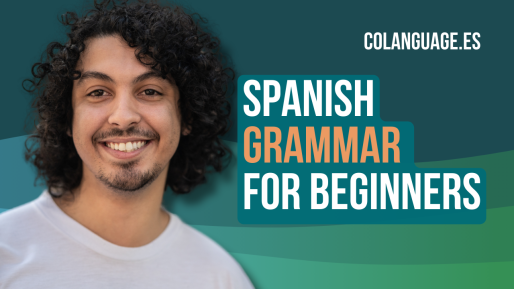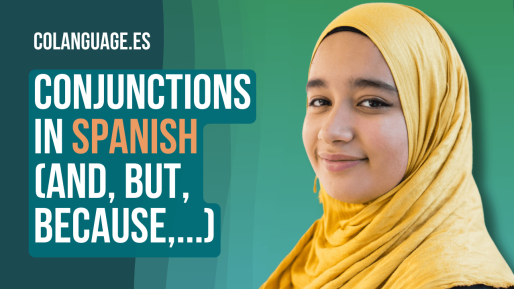Question words in Spanish (what, why, when, how, who, where) Share Copied!
Spanish Telling your name A1 To introduce oneself
Learn how to use the question words in Spanish in everyday conversations.
<< Decir tu nombre (Telling your name)
Video
Podcast
How to ask questions in Spanish?
Question words (what, where, when,...) are used to gather information or inquire about something.
-
¿Qué estás haciendo? (What are you doing)
-
¿Dónde estás? (Where are you?)
-
¿Quién viene a la fiesta? (Who is coming to the party?)
Question words in Spanish
"Qué y cuál" (what and which)
The word "what" is one of the most commonly used when asking questions in Spanish. "Qué" and "cuál" both translate to "what" in English, but they are used in different contexts. "Qué" is used when there are multiple options or when the question is open-ended, while "cuál" is used when there's a specific selection or choice involved.
| Spanish | English |
|---|---|
| ¿Qué hora es? | What time is it? |
| ¿Qué libro prefieres? | Which book do you prefer? |
| ¿Cuál es tu plan para hoy? | What is your plan for today? |
In Spanish, you always start a question with an inverted question mark before the question word or phrase. Close your question with a normal question mark, like you would in English.
¿Cómo estás? (How are you?)
"Cuándo" (when)
The question word "cuándo" translates to "when" in English. It is used to inquire about specific points in time or the timing of events. Understanding how to use "cuándo" is essential for asking and understanding questions related to time.
| Spanish | English |
|---|---|
| ¿Cuándo es tu cumpleaños? | When is your birthday? |
| ¿Cuándo llegas a casa? | When do you arrive home? |
"Dónde" (where)
In Spanish, "dónde" translates to "where" in English. This question word is essential for asking about locations or positions.
| Spanish | English |
|---|---|
| ¿Dónde vives? | Where do you live? |
| ¿Dónde está la estación? | Where is the station? |
"Cómo" (how)
When it comes to asking about the manner or way in which something is done, the question word "cómo" is indispensable. Translating to "how" in English, "cómo" is used to inquire about methods, processes, or descriptions.
| Spanish | English |
|---|---|
| ¿Cómo estás? | How are you? |
| ¿Cómo llegaste? | How did you get there? |
Depending on the context, "cómo" can also translate to "what" in English:
¿Cómo te llamas? (What is your name?)
¿Cómo es tu primo? (What is your cousin like?)
"Cuánto/s & Cuánta/s" (how much/how many)
| Spanish | English |
|---|---|
| ¿Cuánto tiempo llevas esperando? |
How much time have you been waiting? |
|
¿Cuánta agua necesitas para la receta? |
How much water do you need for the recipe? |
|
¿Cuántos amigos te acompañarán al concierto? |
How many friends will accompany you to the concert? |
|
¿Cuántas manzanas hay en la cesta? |
How many apples are in the basket? |
Notice how we use either the singular or plural form of the word in Spanish. It can be used both in masculine or feminine forms.
¿Cuántas manzanas compraste en el supermercado? (How many apples did you buy at the supermarket?)Las manzanas (the apples) is feminine, plural, so we have to use cuántas (how many), which also refers to feminine, plural.
"Quién" (who)
Inquiring about people or identities in Spanish often involves the question word "quién," which translates to "who" in English. Whether you're asking about someone's name, role, or attributes, understanding how to use "quién" is essential.
| Spanish | English |
|---|---|
| ¿Quién ganó? | Who won? |
| ¿Quién trabaja aquí? | Who works here? |
Listening exercise
You can practice using the question words in Spanish with the following dialogue.
| Spanish | English | |
|---|---|---|
| Daniel |
¿Dónde has estado últimamente? |
Where have you been lately? |
| María |
He estado de viaje por Europa. |
I have been travelling around Europe. |
| Daniel |
¿Cuándo regresaste? |
When did you return? |
| María |
Regresé hace una semana. |
I came back a week ago. |
| Daniel |
¿Qué lugares visitaste en Europa? |
Which places did you visit in Europe? |
| María |
Visitamos España, Francia y Alemania. |
We visited Spain, France, and Germany. |
| Daniel |
¿Cuánto tiempo duró tu viaje? |
How long did your trip last? |
| María |
Estuvimos allí durante tres semanas. |
Estuvimos allí durante tres semanas. |
Prepositions with question words in Spanish
Question words can also be combined with prepositions, changing the structure and meaning of a sentence.
"Por qué" (why)
When we pair the preposition "por" with the question word "qué," the resulting phrase, "por qué," translates to "why." This combination delves into the reasons or motives behind actions or situations.
| Spanish | English |
|---|---|
|
¿Por qué llora el niño? |
Why is the boy crying? |
|
¿Por qué llegaste tarde? |
Why did you arrive late? |
Be careful: If written all together and without an accent, it translates to “because”.
Porque quería un cambio. (Because I wanted a change.)
"Para qué" (what...for)
Incorporating the preposition "para" with the question word "qué" forms "para qué," which translates to "for what" or "what for" in English. This combination inquires about the purpose or intended outcome of an action or event.
| Spanish | English |
|---|---|
|
¿Para qué necesitas ese dinero? |
What do you need that money for? |
|
¿Para qué necesitas ese libro? |
What do you need that book for? |
"De quién" (whose/who)
When the preposition "de" is combined with the question word "quién," the resulting phrase, "de quién", translates to "whose" in English. This construction is utilized to inquire about possession or ownership.
| Spanish | English |
|---|---|
|
¿De quién es el coche? |
Whose car is it? |
|
¿De quién has recibido ese regalo? |
Who did you get that gift from? |
"Con quién" (who...with/with...whom)
Combining the preposition "con" with the question word "quién" forms "con quién", which translates to "with whom" or "who with" in English. This combination is employed to inquire about companionship or association.
| Spanish | English |
|---|---|
|
¿Con quién vas? |
Who are you going with? |
|
¿Con quién quieres cocinar? |
Who do you want to cook with? |
In English, we can end a question with a preposition but in Spanish we can’t do that. The preposition must come at the beginning followed by a question word. Let's have a look at the following examples:
¿Quién estás yendo con? (Who are you going with?) wrong!
¿Con quién estás yendo? (Who are you going with?) correct
"Adónde" (where...to)
When the question word "dónde" is preceded by the preposition "a" the resulting phrase, "adónde," translates to "where to" in English. This combination is used to inquire about destinations or directions.
| Spanish | English |
|---|---|
|
¿Adónde lleva este camino? |
Where does this road lead to? |
|
¿Adónde van a viajar? |
Where will you travel to? |
"De qué" (of what/what)
Pairing the preposition "de" with the question word "qué" forms "de qué", which translates to "of what" or "about what" in English. This combination is utilized to inquire about the content or subject matter of something.
| Spanish | English |
|---|---|
|
¿De qué sabor es tu helado? |
What flavour is your ice cream? |
|
¿De qué color es tu coche? |
Of what color is your car? |
Listening exercise
This exercise illustrates how question words can combine with prepositions in Spanish.
| Spanish | English | |
|---|---|---|
| María |
¿Adónde vas tan temprano? |
Where are you going to so early? |
| Daniel |
Voy al supermercado para comprar algunas cosas. |
I'm going to the supermarket to buy some things. |
| María |
¿Para qué necesitas tantas cosas? |
What do you need so many things for? |
| Daniel |
Porque hoy tenemos invitados. |
Because we have guests today. |
| María |
¿De qué país son los invitados? |
What country are the guests from? |
| Daniel |
Son de Italia. |
They are from Italy. |
| María |
¿Por qué no compras también un vino italiano? |
Why don't you also buy an Italian wine? |
| Daniel |
Porque nuestros invitados traerán el vino. |
Because our guests will bring the wine. |
Key takeaways
Here is a quick summary of this lesson.
- Spanish questions begin with an inverted question mark followed by the question word or phrase and end with a regular question mark.
- Pairing prepositions with question words alters the structure and meaning of sentences in Spanish, as seen in combinations like "por qué" (why) and "para qué" (what for).
- Unlike English, Spanish questions require prepositions to precede question words, adhering to proper grammatical structure.
Subscribe to our social media channels to get free daily exercises!



